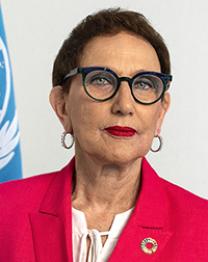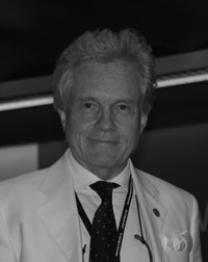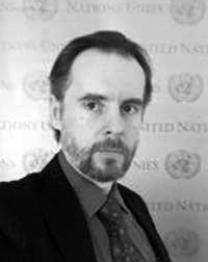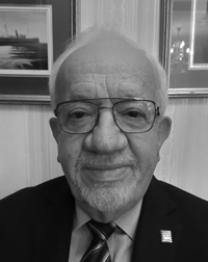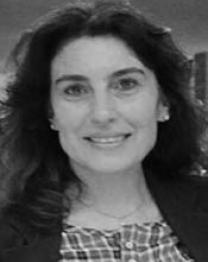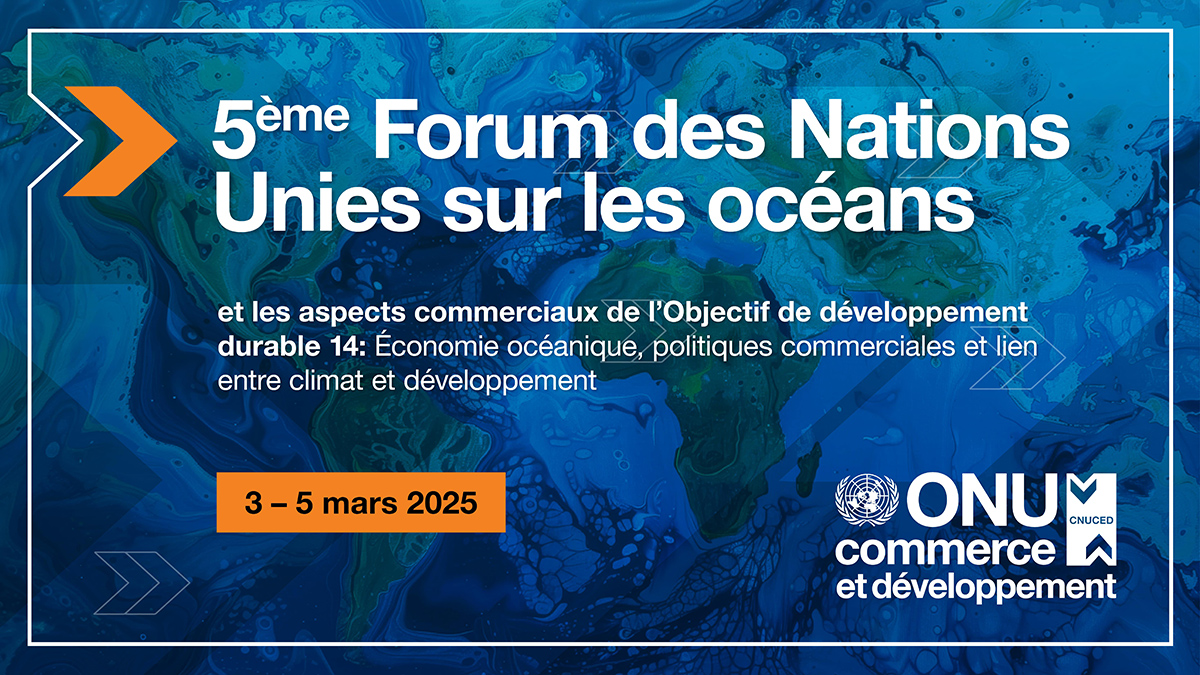
Économie océanique, politiques commerciales et lien entre climat et développement
L’océan est essentiel à toute forme de vie. Il abrite une biodiversité exceptionnelle, régule le climat et produit de l’oxygène, tout en assurant la sécurité alimentaire, en créant des emplois et en stimulant le commerce mondial.
Mais le changement climatique, la surpêche et la pollution menacent les écosystèmes marins et les 600 millions de personnes qui dépendent de la pêche pour leur subsistance.
Le 5ème Forum des Nations Unies sur les océans réunira des dirigeants, experts et acteurs du monde entier pour aligner les politiques commerciales et économiques avec la préservation des océans et l’exploitation durable des ressources marines.
Le forum se tiendra en présentiel et en ligne. Il est ouvert au public, mais l’inscription est obligatoire. Inscrivez-vous dès maintenant.
Un océan d’opportunités menacé par des risques en hausse
L’économie océanique connaît une expansion rapide, offrant de nouvelles opportunités, notamment aux pays en développement et aux communautés côtières vulnérables.
- L’économie océanique progresse plus rapidement que d’autres secteurs. Depuis 1995, elle a crû 2,5 fois, contre 1,9 fois pour l’économie mondiale.
- Le commerce mondial des biens et services liés aux océans a atteint un niveau record de 2 200 milliards de dollars d’exportations en 2023, une forte reprise après la pandémie de COVID-19.
- Le commerce Sud-Sud des produits de la pêche est en plein essor. Entre 2021 et 2023, les exportations de poisson brut ont progressé de 43 % pour atteindre 19 milliards de dollars, tandis que celles de poisson transformé ont bondi de 89 %, atteignant 23 milliards de dollars.
- Les substituts marins au plastique représentent une opportunité de marché de 10,8 milliards de dollars, qui peut contribuer à réduire la pollution plastique tout en ouvrant de nouveaux débouchés commerciaux.
Cependant, des lacunes en matière de gouvernance, des pressions environnementales et climatiques croissantes menacent la durabilité à long terme de l’économie océanique.
- 2024 a été l’année la plus chaude jamais enregistrée pour les eaux marines, avec des températures supérieures de 1,55°C aux niveaux préindustriels, dépassant ainsi le seuil critique de 1,5°C. Cette hausse perturbe les écosystèmes marins. La montée du niveau de la mer met en péril les infrastructures côtières et les routes maritimes, affectant ainsi le commerce mondial.
- L’économie océanique est responsable de 11 % des émissions mondiales de CO2, mais elle demeure l’un des secteurs les moins financés des Objectifs de développement durable. L’ODD 14 (vie aquatique) nécessite 175 milliards de dollars par an, mais seuls 30 milliards de dollars ont été déboursés depuis 2010.
- 22 milliards de dollars de subventions néfastes à la pêche continuent d’épuiser les stocks de poissons et de menacer la biodiversité marine.
Pour en savoir plus sur les opportunités et les risques croissants qui pèsent sur l’économie océanique, lisez notre article : L’économie océanique est en plein essor. Mais pour combien de temps ?
Une plateforme pour l’innovation et l’action
Le 5ème Forum des Nations Unies sur les océans constituera une plateforme clé pour façonner les politiques mondiales sur le commerce et les océans en :
- Présentant un ensemble de recommandations politiques cohérentes – sous forme de résumé des co-présidents (France et Costa Rica) – à la Conférence des Nations Unies sur l’océan de juin 2025, posant ainsi les bases d’engagements volontaires concrets.
- Contribuant aux discussions du Forum sur l’économie bleue et la finance en juin 2025 et à la 16e Conférence des Nations Unies sur le commerce et le développement (CNUCED16) en octobre 2025.
- Coordonnant les efforts mondiaux pour mettre en œuvre des recommandations soutenant l’émergence d’économies maritimes durables dans les petits États insulaires en développement (PEID) et les communautés côtières, en ligne avec la stratégie PEID de la CNUCED (disponible uniquement en anglais).
Le forum verra également le lancement d’initiatives majeures, notamment :
- Une nouvelle base de données sur le commerce océanique, intégrée à UNCTADstat, avec des indicateurs économiques détaillés, des données par pays et des outils de visualisation.
- Un projet conjoint CNUCED – UN DESA (Département des affaires économiques et sociales de l’ONU) sur l’action climatique basée sur les données, utilisant l’intelligence artificielle et l’innovation numérique pour aider les PEID des Caraïbes. Ce projet a été déposé en tant qu’engagement volontaire dans le cadre de la Conférence des Nations Unies sur les océans.
- Une proposition pour un groupe de travail des Nations Unies sur le développement des algues, visant à promouvoir la croissance durable de ce secteur.
Programme du forum
Le 5e Forum des Nations Unies sur les océans comprendra un segment de haut niveau, ouvert par Rebeca Grynspan, Secrétaire générale de la CNUCED, ainsi que cinq sessions thématiques axées sur :
- Les tendances du commerce
- Les Contributions déterminées au niveau national pour les secteurs océaniques
- Le commerce Sud-Sud
- Les produits marins innovants
- La finance bleue
La CNUCED et la FAO (l’Organisation des Nations Unies pour l’alimentation et l’agriculture) présenteront le contexte dans lequel s’ouvriront les discussions du forum. Une interprétation simultanée sera disponible dans les six langues officielles des Nations Unies.
Les partenaires du forum organiseront également des événements parallèles explorant les liens entre politiques commerciales, économie océanique et action climatique.
Événement spécial : Expo des produits et services marins (EN)
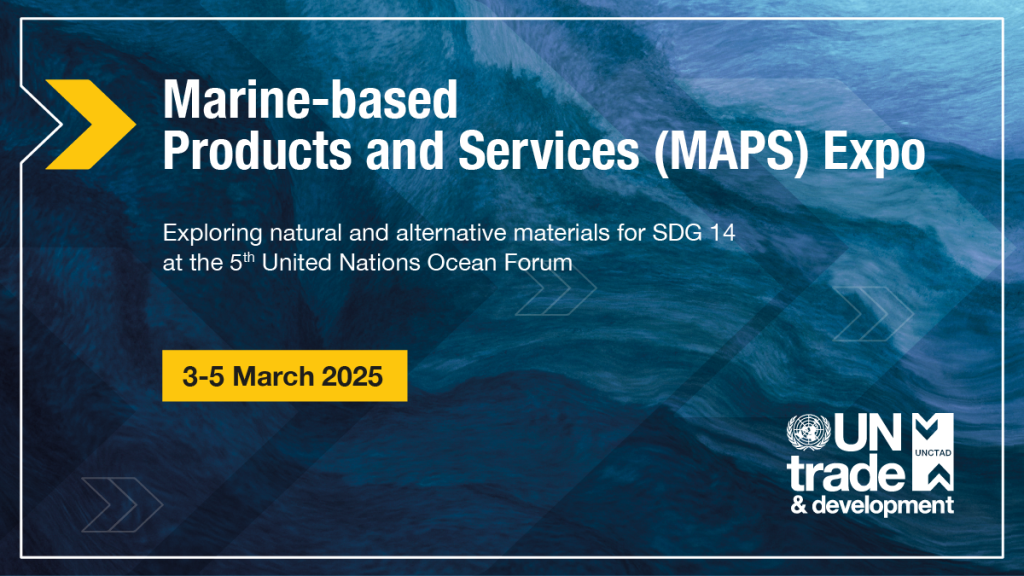
En marge du forum, l’Expo réunira 14 exposants, organisations internationales et entreprises privées, qui mettront sous les projecteurs des produits et services durables liés aux océans.
Elle transformera le 3e étage du Palais des Nations en un véritable hub de l’économie océanique, offrant aux participants une occasion unique de découvrir les innovations de pointe veillant à une exploitation durable des océans.
Partenaires du forum
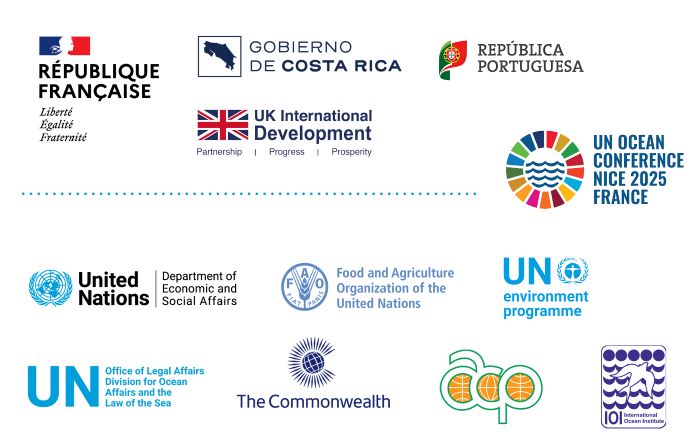
In September 2021, Rebeca Grynspan was appointed Secretary-General of the United Nations Conference on Trade and Development (UNCTAD), becoming the first woman to lead the organization in its 60-year history.
Rebeca Grynspan, an economist and former Vice President of Costa Rica, is an experienced leader of international institutions with a substantive track record in government, UN diplomacy, economic policy and multilateral cooperation at the global level.
Prior to joining the United Nations, she was Vice President of Costa Rica and held cabinet positions as Minister of Housing, Minister Coordinator of Economic and Social Affairs and Deputy Finance Minister.
Previously, she served as Secretary-General of the Ibero-American Conference (2014–2021), chairing regional summits of Heads of State and Government; United Nations Under-Secretary-General and Associate Administrator of the United Nations Development Programme (UNDP); and UNDP Regional Director for Latin America and the Caribbean. She was a member of the UN Commission for the Reconstruction of Haiti, representing the UN Secretary-General.
At UNCTAD, Grynspan has been at the centre of critical negotiations to address global trade and development challenges. She played a decisive role in the successful Black Sea Grain Initiative brokered between the UN, Türkiye, the Russian Federation and Ukraine, which enabled the safe export of over 32 million tons of grain, lowered global food prices by 22% and prevented millions from falling into food insecurity. She also leads the UN Global Crisis Response Group on food, energy and finance, and has represented the UN in G20 summits.
Her leadership has been recognized widely. In 2024, she received the Doha Negotiator of the Year Award for spearheading UN efforts to restore Black Sea trade routes. In 2025, Spain’s Ministry of Foreign Affairs, European Union and Cooperation awarded her the inaugural Isabel Oyarzábal Women in Multilateralism International Prize for her contribution to multilateralism.
Ms. Grynspan holds degrees in economics from the University of Costa Rica and the University of Sussex, and honorary doctorates from several European universities.
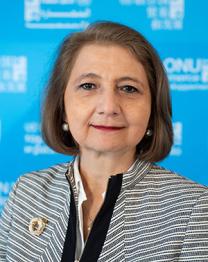
Luz Maria de la Mora is the Director of UNCTAD's Division on International Trade and Commodities. As a former Vice-Minister for International Trade and decades of government and private sector positions, Ms. de la Mora developed a career in international trade policy, negotiation, operations, and trade promotion.
During her tenure as Vice-Minister for International Trade of Mexico from 2018 to 2022, Ms. de la Mora led Mexico's trade and investment policy, overseeing fourteen free trade agreements with 51 countries. To bolster Mexico's development, she steered discussions in the World Trade Organization, the United States-Mexico-Canada Trade Agreement, Comprehensive and Progressive Agreement for Trans-Pacific Partnership, and Pacific Alliance, among others. She also coordinated policy dialogues and handled private sector consultations.
Ms. de la Mora holds a PhD in Political Science from Yale University, USA, a Master's degree in International Affairs from Carleton University, Canada, and a Bachelor's degree in International Relations from El Colegio de México, Mexico.
She is fluent in English and Spanish, and proficient in French.
Audun has been with FAO for 25 years, where he is currently the Deputy Director of the Fisheries and Aquaculture Division. Audun was for many years also the Secretary of FAO’s Sub-Committee on Fish Trade (COFI:FT), the main international body for discussion and recommendations on trade and market issues in the sector, as well as the Coordinator of the GLOBEFISH project.
His thematic work areas include aquaculture policy development and management, commodity price trends and price indexes, policy issues related to international trade and market access, market-based instruments, social responsibility, certification, traceability, trade and food security, gender issues, and domestic and regional market development.
Before joining FAO, he worked as an independent agribusiness consultant, project manager at Norway’s Embassy in Italy, and financial analyst on the Oslo Stock Exchange.
Audun has a Ph.D. in Agricultural Sciences from the Sea Fisheries Institute in Poland, a Master’s in Business Administration from Harvard University, and a Bachelor of Arts in Economics from the Norwegian School of Economics.
Mr. Vladimir Jares is the Director of the Division for Ocean Affairs and the Law of the Sea, Office of Legal Affairs of the United Nations Secretariat. He has dealt with many issues concerning the law of the sea, in particular those related to the implementation of the 1982 United Nations Convention on the Law of the Sea and related Agreements. Since 1997, he has been involved in providing services to the Commission on the Limits of the Continental Shelf and has served as its Secretary. He has also been involved in capacity-building activities of the Division, delivering many of its training courses, including on UNCLOS article 76 implementation.
A former United Nations diplomat with 27 years of experience in the diplomatic service. He served on request as Secretary of the Ministerial meetings of the G77 prior to UNCTAD in Tehran, Havana, Morocco, South Africa and as Secretary of the G77 regional meetings in Bangladesh, Jordan, Lebanon.
He assisted and advised the Government of Qatar in organizing the South Summit in Doha, 2004, and other countless events including the GATES conference in Shanghai and GPA in Beijing.
He has BA in business administration from Mustensiriya University (1968) and a Msc and PhD at the University of Wales (1972-76).
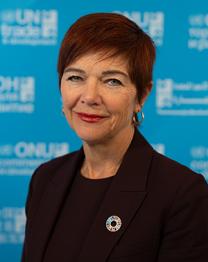
Dr. Carpentier, from Quebec, Canada, is Head of Trade, Environment, Climate change, and Sustainable Development Branch of UNCTAD’s Division on International Trade and Commodities (DTIC). Her work with governments and partners foster green, blue, circular, and impact economies that supported by trade, are key to addressing the triple planetary crisis: climate change, pollution and biodiversity loss. She came to Geneva after leading the UNCTAD New York office, representing the SG and coordinating UNCTAD’s support to inter-governmental negotiations of the UN General Assembly (2015-2023).
She held several other positions. At the UN Department of Economic and Social Affairs, she facilitated the engagement of NGOs, women and youth’s groups, business, local authorities, etc. in the SDGs negotiations and the UN Rio+20 Conference (2011-2015). She also supported the Commission on Sustainable Development research and negotiations on sustainable agriculture and sustainable consumption and production (2007-2011).
Prior to joining the UN, she Headed the North American Free Trade Agreement Commission for Environmental Cooperation’s, Environment, Economy and Trade Division (2000-2007), was Agro-environmental policy analyst for Winrock International (1998-2000) and post-Doctoral fellow/Brazil office manager for the International Food Policy Research Institute (1996-1998).
She has a PhD. in Agro-Environmental Economics from Virginia Tech, as well as a MSc. and BSc. in Agro- Economics from McGill University and is an ironman and ultramarathoner. She is a Yale World Fellow, received the 2023 Schwab Foundation for Social Entrepreneurship public intrapreneur award, and is a UNEP Who’s Who of Women and the Environment.
Frida Youssef is the chief of the Transport Section within the Trade Logistics Branch at UNCTAD.
She has more than twenty-five years of professional experience in areas related to trade, logistics, commodities, finance, and sustainable development, which has given her the opportunity to build, lead and motivate research and technical assistance programmes, geared towards developing countries in a broad range of issues, including commodity supply chains and structured finance, public-private partnerships (PPPs), maritime transport and ports, transit transport and corridors, and cross-cutting issues such as environment, climate change, gender, finance and investment. She is a co-author of the UNCTAD's annual Review of Maritime Transport. Frida holds an MBA from Boston University and an MA in International Affairs from the Hautes Etudes Internationales - Paris.;
She is a member of the Steering Committee of the Global Network of Export-Import Banks and Development Finance Institutions (G-NEXID). She is also on the Steering Committee of the Port Chapter of the World Association of PPPs Units and Professionals (WAPPP).
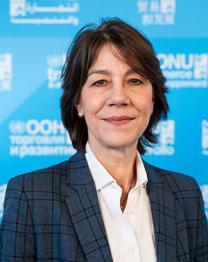
Regina Asariotis is Chief (a.i.) of the Trade Logistics Branch in the Division on Technology and Logistics of UNCTAD with responsibility for UNCTAD’s related work, including coordination of the UNCTAD Review of Maritime Transport 2025. She is also Chief of the Policy and Legislation Section, with responsibility for UNCTAD's work on transport law and policy.
Before joining UNCTAD in 2001, Regina was a Senior Lecturer in Maritime Law at the University of Southampton and a member of the Governing Board of the Institute of Maritime Law, an internationally leading centre for research and teaching in the field.
She holds a German law degree (Bavaria), an English LL.M (Soton) and a German doctorate in Maritime Law (Dr. jur., Hamburg) and is a practising Barrister (England & Wales), an Attorney at Law (Greece), as well as Member of the Chartered Institute of Arbitrators (CIArb).

David Vivas Eugui is Chief of Ocean and Circular Economy Unit, a.i., Trade, Environment, Climate Change and Sustainable Development Branch, at UNCTAD.
Previously, he was a Senior Economic Affairs Officer in UNCTAD’s Trade Negotiations and Commercial Diplomacy Branch, Deputy Programmes Director at the International Centre for Trade and Sustainable Development (ICTSD), Senior Attorney at the Center for International Environmental Law (CIEL), Attaché for Legal Affairs at the Mission of Venezuela to the World Trade Organization (WTO) and Staff Attorney at the Venezuelan Institute of Foreign Trade. David is an international expert with more than 20 years of experience on legal and economic issues.
He has worked as an advisor and consultant for various institutions, international and national organizations and has lectured on intellectual property, trade, oceans economy and environmental law at the University of Strasbourg (CEIPI), Universidad de Buenos Aires (Argentina), Universidad Javeriana (Colombia), Maastricht University (the Netherlands), WIPO Distant Learning Academy, and University of Business and International Studies (Switzerland).
He holds a JD from the Universidad Catolica Andres Bello, an LLM from Georgetown University and a Master in Transnational Business from the Universidad Externado de Colombia.
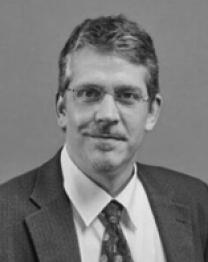
Christophe Bellmann is the Head of Policy Analysis and Strategy at the Forum on Trade, Environment and the SDGs.
He is also an Associate Fellow at Chatham House and a Visiting Fellow, at the Institute of International Trade of the University of Adelaide. Since 2014, he serves as adviser to the group of least developed countries in WTO negotiations. His work focuses on trade and environment, climate change, the circular economy, development and food security.
Before joining TESS, Mr. Bellmann was a Senior Policy Advisor at the International Institute for Sustainable Development (IISD) and a Senior Resident Research Associate at the International Centre for Trade and Sustainable Development (ICTSD). Over the course of his career, he has worked in different capacities for various international organizations including FAO, UNCTAD, the OECD, the WTO and ECLAC.
He holds a master's degree from the Graduate Institute of International and Development Studies in Geneva.
Vincent Doumeizel is Senior Adviser on the oceans to the United Nations Global Compact as well as director of the Food Programme at the Lloyd’s Register Foundation.
A self-described optimist and global citizen, Vincent has in recent years devoted himself to promoting a food revolution and environmental solutions based on sea resources, especially seaweed. Vincent leads the charitable objectives of the Foundation through the funding of innovative projects to drive safety in the food supply chain.
Partnering with the UN, FAO, World Bank, WWF, universities, NGOs and large brands, Vincent released the “Seaweed Manifesto” and now co-leads the Global Seaweed Coalition with the objective to scale up the seaweed industry safely in order to address some of the world’s most important challenges, such as hunger, global warming, pollution and poverty.
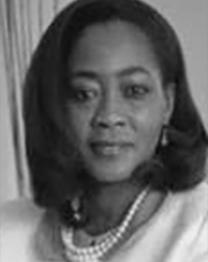
Ms. Jessy Carmelle Petit-Frère is a professor, researcher and speaker at Université Publique du Sud au Cayes. She is also the Founder and Principal (Chief Executive Officer) of Executive Management Consultancy Inc. in Port-Au-Prince, Haiti.
Previously, she worked for the World Bank in the capacity of Project Management in the education sector. She is a private sector development specialist at the United Nations Industrial Development Organization (UNIDO). She implemented a youth entrepreneurship program/small business development project in Comoros. In Haiti, she was Minister of Commerce, Trade and Industry and worked to promote and foster the development of domestic commerce, small and medium enterprises (SMEs) and industries.
As Minister of Haitians Living Abroad, she developed and implemented policies, programs, and services to facilitate the integration and involvement of Haitians living abroad. She has gained many professional experiences with leading international organizations. She conducted business missions to 43 countries in Europe, Latin America, Africa, Oceania, and Asia to negotiate projects and set up contractual agreements. She was a panelist at UNCTAD on Trade Capacity Building.

Usha Chandnee Dwarka-Canabady is Permanent Representative of the Republic of Mauritius to the United Nations and other International Organizations in Geneva.
Prior to this appointment, Ambassador Dwarka-Canabady was, since November 2015, Secretary for Foreign Affairs of Mauritius, after having been acting Secretary for Foreign Affairs between April 2013 and October 2015. She was also Head of the Multilateral Economic Directorate (January 2007 to March 2013) and Head of the Multilateral Political Department (May 2006-2007) of the Ministry of Foreign Affairs, International Trade and Regional Integration in Port-Louis, Mauritius.
Mrs Dwarka-Canabady has a BA in Psychology, Sociology and English from the University of Leicester, an MA in International Politics from the University Libre of Brussels, and a Diplomatic Studies Program Certificate from the Graduate Institute International Studies in Geneva.
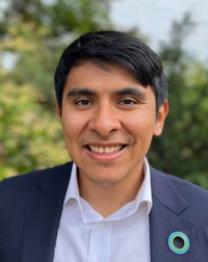
Alfredo is Head of the World Economic Forum’s Ocean Action Agenda and Friends of Ocean Action. He has wide experience spearheading the creation of public-private partnerships to address pressing ocean challenges related to marine conservation and restoration, sustainable fisheries management, scaling up ocean innovation, and accelerating the transition of industries towards nature-positvie practices for the blue economy. His work has contributed to strengthening the role of science and technology in marine policy and business practices in several countries and to influence intergovernmental processes.
He holds a PhD in Oceanography from the Scripps Institution of Oceanography and a Bachelor in Science from Universidad Autonoma de Baja California, Mexico. He is a Roger Revelle awardee by the US National Academy of Sciences in 2021 for his contributions to global ocean policy.
He is a national of Austria with over 15 years of professional experience in environmental diplomacy, policy, and law. He began his professional career at the regional and national levels and joined UNEP in 2005, fulfilling growing responsibilities for the organization. Most recently, he was deputy director and acting director (2019–2021) of UNEP’s Law Division.
Among his key professional achievements are the repositioning of the Montevideo Environmental Law Programme, his work on improving governance of natural resources, human rights and the environment, or his support to the implementation of Multilateral Environmental Agreements (MEAs), among others. In 2012, he led the planning and organization of the first World Congress on Justice, Governance and Law for Environmental Sustainability as part of the UN Conference on Sustainable Development (Rio+20).
Earlier in his career, Arnold worked in the governmental, non-governmental and private sectors. He holds a doctorate in international law from the University of Vienna and a master's degree in advanced international studies from the Diplomatic Academy of Vienna.
Emma Algotsson is the founder and project lead of Catchgreen, a South African startup and collaborative research initiative tackling marine sustainability. Under her leadership, Catchgreen has pioneered the development of specialized marine compounds and executed successful fishing net trials—including pilot programs in Kenya focused on seaweed farming and gear exchange. These innovations directly address critical challenges such as abandoned, lost, or discarded fishing gear (ALDFG), ghost fishing, and ocean plastic pollution.
With over eight years of experience in the trade and manufacturing of biodegradable and compostable plastics, Emma is also the founder of the South African Compostable Plastics Council (COPCO). COPCO advocates for the compostable plastics industry, promoting alignment with international certification standards and driving sustainable product innovation.
Emma holds an M.Phil from the University of Cambridge and a CPE in Law from City, University of London. Her work is driven by a deep commitment to creating solutions that serve both the planet and its people.

Commerijn Plomp is First Secretary at the Netherlands’ Permanent Representation in Geneva. She works in the economic section, where she covers WTO, WMO and WIPO. Since early 2024 she has been co-chairing the steering committee of the WTO’s Fish Fund. Upon entry into force of the WTO’s Fisheries Subsidies Agreement the Fish Fund will be ready to support developing countries in their implementation of obligations. Commerijn has a keen interest in nature conservation and in several previously held positions she was involved in projects with the fisheries sector and in port development.
Danielle Howell is a Disaster Risk Management Consultant who started her career interning at the Caribbean Disaster Emergency Management Agency (CDEMA) in 2015 post graduating from University of the West Indies, St. Augustine Campus with a Bachelor’s of Science in Environmental and Natural Resources Management.
Ms. Howell joined the Department of Emergency Management (DEM) in 2016 where she spent five years as a Consultant and a Programme Officer. Danielle’s portfolio at the DEM included working with the Technical Standing Committee on Coastal Hazards and coordinating the Coastal Hazards and Earthquake Smart Month of Activities, inclusive of the annual Caribe Wave regional exercise.
Ms. Howell’s biggest project at the DEM involved working closely with The United Nations Educational, Scientific and Cultural Organization (UNESCO) Tsunami Ready Recognition Pilot Programme, to ensure that the north western coast of the island of Barbados received its Tsunami Ready status. Success was achieved in September 2020 when Shermans, St. Lucy to Mullins, St. Peter was recognized as Tsunami Ready. During this interim, Danielle also maintained the DEM’s social media platforms and was the brainchild behind the annual “Run Tsunami Run: 5K Walk and Run”.
Over the years, Danielle facilitated many presentations on Introduction to Disaster Management, participated in the World Bank’s Understanding Risk Conference as a youth panelist and attended the Environmental Management and Sustainable Development training course in Suzhou, China.
In 2020, Danielle captured the prestigious Chevening scholarship funded by the Foreign, Commonwealth and Development Office and travelled to the United Kingdom to pursue a Master’s of Science in Coastal and Marine Resources Management at the University of Portsmouth. Her dissertation focused on bridging the relationship between coastal and marine management, disaster management and public communication and was titled “A critical evaluation of public attitudes and perceptions to coastal hazards: A case study of Barbados”. It is anticipated that this research will aid in shaping a communications strategy for coastal risk management in Barbados by increasing public awareness and education that will assist the country to become a better prepared and resilient coastal island.
Danielle is a current member of the Kiwanis Club of Barbados Young Professionals and the Caribbean Youth Environmental Network (CYEN) where she sat on the Executive Board during 2019- 2020 calendar year.
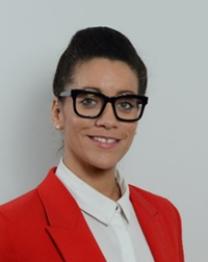
Minna Epps is the Global Ocean Director of the International Union for Conservation of Nature, IUCN), leading the Union’s global ocean-related work, including programmatic development and delivery of multi-million dollar progammes dedicated to commissioning cutting edge marine scientific research (ocean acidification, deoxygenation and marine heatwaves and how it effects marine biodiversity and ocean health), implementing pioneering nature-based solutions, sustainable blue economy solutions and deploying innovative blended finance mechanisms in partnership with private investors and public funding.
Global ocean policy work include Head of IUCN Delegations for various Multilateral Environmental Agreements and negotiations including the recent High Seas BBNJ Treaty negotiation.
She brings her experience from IUCN, Marine Stewardship Council, European Commission, United Nations Environment programme, World Trade organisation, and marine conservation NGOs. Minna is a marine biologist with studies from Imperial College, Rhode Island School of Oceanography and UC Berkeley.
Sainabou Taal heads the fisheries subsidies work at the World Trade Organization. Sai previously worked in the WTO Development Division, the United Nations Department for Economic and Social Affairs and the Gambian Ministry of Trade, Industry and Regional Integration.
Sai holds an LLM from the University of Edinburgh, a Master in International Law and Economics from the World Trade Institute, and a B.A in Economics from the University of Toronto.
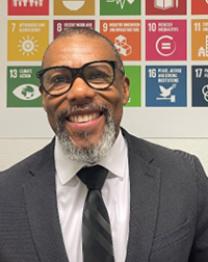
Ronald Jackson has over Twenty (23) years of experience in Disaster Risk Reduction, Recovery and Management. He is currently the Head of Disaster Risk Reduction, Recovery and Resilience Building Team within the Crisis Bureau at the United Nations Development Programme.
Ronald has served as the Executive Director of the Caribbean Disaster and Emergency Management Agency for seven (7) years where he led the framing of the 2014-2024 Comprehensive Disaster Management Strategy for CARICOM and the Development of the Caribbean Pathway for Resilience in 2018; He was instrumental in establishing the Regions First Caribbean Consortium for Multi-Hazard Early Warning Systems in 2019, The Establishment of the Regional Training Centre and the Caribbean Risk Information System in 2018 and 2019 respectively.
He has also served as the Director General and Deputy Director General of the Office of Disaster Preparedness and Emergency Management (ODPEM) in Jamaica where he received a Certificate of Commendation from the Caribbean Community for his contribution to the rescue and recovery efforts in the aftermath of the January 2010 Haiti Earthquake.



